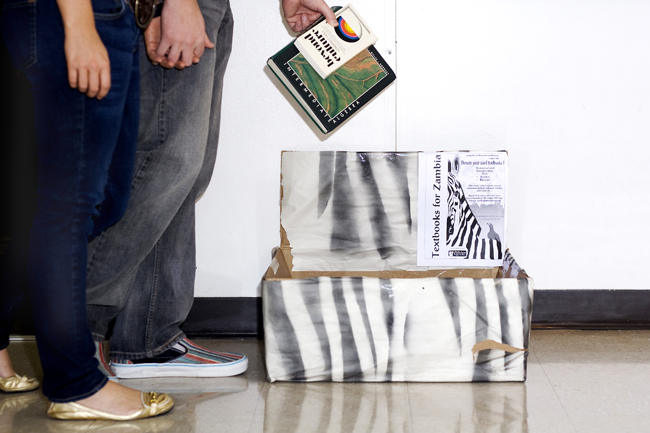A way to a better education
A group of USU business students are helping give Zambian children a better life by organizing a textbook drive through Zambia’s Scholarship Fund. Students and faculty can help support the cause by placing textbook donations in zebra-striped boxes located throughout campus and at several apartment complexes.
The students involved in the drive are members of MHR 3110, a management and human resources class, and are required to spearhead a project for the class. The group leader, or CEO, Rosa Thornley, junior in business administration, said she had an interest in the Zambia’s Scholarship Fund after attending a lecture by the director of the foundation.
“(The director) focuses on total education programs,” Thornley said. “She cycles (Zambian) children through grade school, high school and college, and then works towards students in the teacher’s college coming back to teach students in grade school,” Thornley said.
Thornely said the scholarship fund’s main focus right now is to stock the school’s libraries. She said there is a great need for math, science and business college- and high school-level textbooks. She said sample textbooks from faculty are also well received.
“The books the schools have right now would fit in a kitchen,” Thornley said. “Students wait in line for the student in front of them to finish the book. They’re that low on materials,” she said.
Thornley said textbook donations in all subjects are greatly appreciated, along with school supplies, musical instruments and medical equipment. She said the books and other materials should be in good condition and contain current, not outdated information. She said they also must not contain sexual, violent or materialistic content.
Thornley said the group’s goal is 2,000 textbooks, a number that may seem large but that could be easily reached if students are aware of the cause.
“Even if we have 10 percent of the students (at USU) donate one book it would get us close to our goal,” Thornley said.
Brad Cropper, junior in operations management, is a member of the MHR group and said the project is progressing.
“We are currently at 500 (books), about one-fourth the way there,” he said.
If students or faculty have large donations that may not fit in the zebra boxes, Thornley said her contact information is written on each of the boxes and they can arrange to pick up the materials.
Thornley said the group plans to run the boxes through Nov. 17. She said they are also trying to make arrangements with the USU Bookstore to have boxes near buyback stations at the end of the semester.
Jeremy Carter, junior in marketing, another member of the MHR group, said this will allow students to donate books the Bookstore won’t buy back.
“Everybody has at least one book the Bookstore won’t buy back,” he said.
Thornley said the zebra-striped donation boxes are located at the TSC Hub, TSC computer lab, Business building, LDS Institute, library, Engineering building and at Old Farm, Bridgerland and Oakridge apartment complexes so students living near those areas don’t have to haul their donations to campus. She said the group is also trying to involve the Brigham City and Salt Lake City USU campuses. She said Logan and Cache Valley schools have been very supportive, donating about 250 books. Stevens Henager College and Bridgerland School of Applied Technology also has donation boxes at their campuses and are encouraging students and faculty to support the program.
Thornley said the biggest problem is that since books have been donated, several have “disappeared” out of the boxes. Thornley said she knows textbooks are expensive, but feels that once the books have been donated and are in the boxes they aren’t free game to students.
“Once (donated books) are in the box they belong to the children in Zambia,” she said. “Have respect for donations.”
Thornley said although USU students may feel like poor college students, the children in Zambia have a greater need.
“We’re talking about people who have absolutely nothing,” she said.
–karlie.brand@aggiemail.usu.edu

